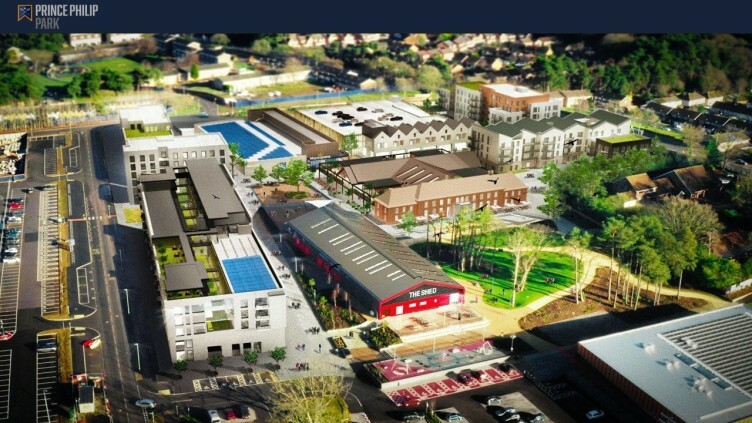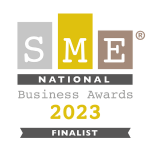REGENERATION
How Do We Build Resilience Into Our Town Centres?

(What we've learned from six years at the forefront of town centre regeneration in Whitehill and Bordon)
Our high streets and town centres are in a state of disrepair and dilapidation. The popularity of internet shopping and home deliveries mean that most commercial transactions no longer need to take place in the centre of the town, almost everything can be done from home. With town centre footfall and dwell time drastically reduced many businesses struggle to make a living and close, leaving gaps in retail that in turn decrease the appeal of the once busy town centre.
Up and down the country regeneration efforts attempt to reverse the decline. More often than not the success of these attempts is very short lived. We are still searching for an answer to the question - how do we make town centres appealing again in the long term?
At SiGNAL we are lucky to have spent the last six years working on the regeneration of the former training base at Prince Philip Barracks, Whitehill and Bordon. Our brief was to work with the Development Manager appointed by the Defence Infrastructure Organisation for the regeneration of the site, Whitehill and Bordon Regeneration Company (WBRC), to create an economic catalyst for regeneration at the heart of the town. No mean feat.
We have been doing this by focusing on the provision of accessible and affordable workspace, office space and maker space, and by wrapping up our workspace lets in a package of business training and support. At the same time WBRC, the regeneration company, are bringing to market a portfolio of small and medium sized retail outlets and micro-offices that can be used as a test base for startups in the area.
We consistently prioritise community, networking and events, bringing together all the local stakeholders and businesspeople into a space where they can build significant and long-lasting business relationships. These relationships in time begin to form the creative and commercial direction of the town centre development.
We hold lively and entertaining events for stakeholders every month where the town’s businesspeople meet up to learn about business and hear about new opportunities being thrown up by the ongoing regeneration. Councillors and landlords as well as businesses owners and developers all discuss and feed ideas into the central melting pot, while also developing new business relationships and collaborating over projects. The events are very popular, attracting 40 plus businesses each month.
As a result, the nascent town centre is a thriving hub of small and independent businesses all connected to each other through the Whitehill and Bordon Regeneration Company and SiGNAL. The culture in the town is one of enterprise and enthusiasm for entrepreneurship. The central building known as The Shed was opened in May 2021 and is now home to 27 local businesses, combining retail, food, entertainment and offices. All units are full and there are waiting lists of businesses wanting to move in.
We certainly don’t have all the answers to the crisis in our town centres and our experience so far is only based on our work in one town. However, we have learned a lot over the last six years about how to build thriving business communities in empty, failing and developing areas. We hope that in the future we will have the opportunity to share our knowledge with landlords of other empty spaces in other towns.
Based on our experience here are the key elements to consider when trying to invigorate a failing town centre in a way that will sustain beyond the length of the regeneration project:
Community engagement: Engaging with residents, businesses, community organisations, and other stakeholders is vital. Their input, ideas, and aspirations should be solicited and incorporated into the decision-making process, fostering a sense of ownership and inclusivity. A regeneration team that cares about the sustainability of its projects will take great care to make sure that this is done consistently and diplomatically from the outset.
Working together: There should be a genuine process for local business to feed ideas and resources into the development as it unfolds. It’s a great idea to make sure that any local businesses that are relevant to the building of the infrastructure are given an opportunity to meet stakeholders and apply for tenders from the outset. Using local suppliers can generate invaluable goodwill.
Entertainment: bringing the town together through shared interests by means of concerts, theatre shows, carnivals, festivals and sports or business events is an excellent way to bring the feelgood factor to town centres as well as boosting commercial activity. Asking businesses to sponsor or take part in events creates visibility for them and cash=h for the c=event. There needs to be accessible and central places, indoor and outdoor for events to take place. The Romans and Greeks understood this and built towns that featured theatres as central gathering places.
Diversity and inclusivity: Creating a welcoming and inclusive town centre means considering the needs and aspirations of diverse communities. This includes accessible infrastructure, opportunities for marginalised groups, and initiatives that celebrate cultural diversity.
Preservation of local heritage: Recognising and preserving the historical, architectural, and cultural heritage of the town centre ensures the continuity of its unique character. This can involve renovating heritage buildings, promoting local arts and crafts, and organising cultural events. Heritage projects can help develop the identity of the town and bolster local pride which will in turn attract people to the area.
Better public spaces: Revitalising or creating new public spaces like parks and playgrounds might not have a direct economic impact, but it’s essential for improving community vitality. They should also provide suitable spaces for cultural events.
Better workspaces: A focus on small business is critical as they form the backbone of the town centre hub, keeping residents and their cash local by providing everything from vital services to luxury products. Small affordable offices are ideal for the ‘work near home’ crowd and for small businesses and start- ups. Often these can take the place of traditional retail and bring much needed spend and footfall to town centres. Other workspaces should also be made available, workshops and makerspaces for example. Co working space is another great way to bring workers into the town centre during the working day and to create relationships between business owners.
Good Connectivity: this is now a vital consideration and must be super speedy to attract businesses. Good Wi-Fi in communal spaces also attracts footfall and increases dwell time.
Good Parking: especially in rural areas not best served by public transport, Parking should ideally be free at least long enough for an unhurried visit to the shops. This will generate great goodwill with the town centre businesses as it will have a direct impact on footfall, immediately increasing town centre resilience.
Its no secret that I believe the key to successful long term town centre regeneration is the engagement of local business. The bricks and mortar businesses need to feel included in the process and supported through it. Working from home businesses need to be given a place to meet other businesses, find business support and collaborate. A mixture of start up space - small, affordable, flexible, and grow on space is needed to keep the business ecosystem functioning. All spaces should be connected through events and partnerships.
Business owners are usually resourceful and creative and their energy and understanding of their marketplace should be consistently utilised to support regeneration plans. By bringing business people and stakeholders together on a regular basis, resilience will be built as connections are formed and collaborations get underway. These relationships will sustain the health of the town centre long after the regeneration teams have moved on.
If you would like to know more about how to create a vibrant workhub in your empty commercial space PM me here or visit www.emmaselby.com to book a call







